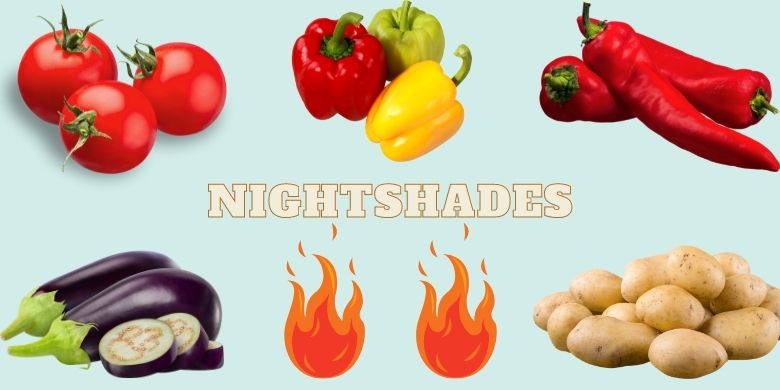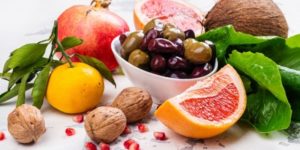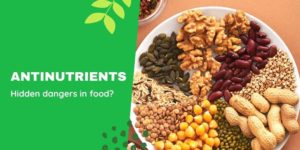Today I’d like to discuss nightshades, a family of foods that is widely misunderstood. You may not know but some of the foods that you eat often are actually nightshades.
What are nightshades, and what do they do? Let’s take a look at nightshades in detail including top foods in the nightshade family.
What Are Nightshades?
Nightshade vegetables and fruits are members of the ‘Solanaceae’ family of plants. About 2,000 plant species belong to the nightshade family. Some of them are edible, while others are poisonous. In fact, a few of them are nutrient-dense and are a staple food in many cultures.
Top Foods in the Nightshade Family
There are thousands of nightshades on the planet. Some are edible fruits, vegetables, and herbs, while others are non-edible. Today, we’ll look at the edible nightshades that we eat often.
Top foods in the nightshade family include:
- Eggplant
- Tomatoes
- Capsicum
- Peppers
- White potatoes
- Gooseberries
- Ground cherries
- Goji berries
- Paprika
- Tomatillos
- Chilli
- Ashwagandha
There are other nightshade vegetables and herbs, but these are the ones most people think about when they think of nightshades.
Why Are They Called Nightshade Vegetables?
So, why are nightshades called nightshades? Some people associate it with their dark color, while others say it is due to the fact that these plants thrive in the shade and flower at night.
What’s Wrong with Nightshades?
Let’s talk about the most interesting aspect of nightshades.
When we hear the word nightshade, we automatically think of something bad or toxic. Why is it that nightshade has such a poor reputation?
It is because nightshades contain a number of compounds that have been linked to negative health effects in humans.
Nightshades contain glycoalkaloids, calcitriol, saponins, nicotine, capsaicin, and lectins.
Plants secrete most of these chemicals as a line of defense against bacteria, bugs, insects, and animals. Plants produce these natural pesticides to keep pests and predators away.
Unfortunately, as we consume nightshade foods, they enter the human body as well.
These chemical compounds are believed to be the cause of a variety of health issues. They function as allergens and can induce inflammation in certain individuals. According to research, glycoalkaloids can cause leaky gut and inflammatory bowel disease.
All of these things are true but for some people, not for everyone. Everyone’s body is different and responds differently.
Most of those plant chemicals are not so strong, and the human body can easily cope with them.
So, not everyone has a nightshade allergy. Some of these foods are actually nutrient-dense and have many health benefits.
However, if you are one of those who experience problems after eating these foods, then you should keep an eye out for foods that belong to the nightshade family.
Symptoms of Nightshade Allergy
Some people’s digestive systems may not handle the chemical compounds contained in nightshade. As a result, their body shows a variety of irritations and allergic reactions.
When our digestive system isn’t strong enough to break down these plant compounds, they end up in our bloodstream, causing inflammation.
Following are some of the symptoms that some people may experience after consuming nightshade food.
- Skin rash or itching
- Fatigue
- Joint pain
- Allergies
- Excessive mucus production
- Gut inflammation
- Gas
- Abdominal discomfort
- Diarrhea
People who already have weak digestion and gut issues, such as leaky gut, irritable bowel syndrome, are more likely to have problems when they eat nightshade foods.
Should You Avoid Nightshades?
Are you concerned about these foods due to their recent negative publicity and don’t know what to do about it? Or, do you actually experience any symptoms after consuming certain food and are unsure what to do? Let’s look for answers to both questions.
As we now know, nightshade foods contain natural chemical compounds such as alkaloids and lectins. The human body can usually cope with it and digest it really well, but it can be difficult for some people.
If you are one of those people who do not experience any symptoms, then you do not need to worry about it. But keep in mind that anything in excess is bad. Even drinking too much water is harmful to one’s health.
However, if you do get a symptom then follow an elimination diet to figure out which foods are causing the problem.
The elimination diet entails eliminating all of those foods one at a time for a period of time to see if you feel any better.
If you’ve discovered that avoiding those foods is actually improving your issues, then you may want to reduce your intake of those foods or take a break from them for a while.
Tip: There is a hack for nightshade. The alkaloids and lectins in nightshade foods can actually be reduced. All you have to do is remove the skin and seeds and cook them properly.
What Can I Substitute for Nightshades
So, I know I have nightshade allergies, what can I substitute for nightshades?
- Use carrots, cucumber instead of tomatoes.
- Use mushrooms, zucchini instead of eggplant.
- Use radishes, onions instead of peppers.
- Use sweet potatoes, jicama, pumpkin instead of white potatoes.
- Use grapes instead of goji berries.
- Use mustard sauce, ginger instead of chili.
Frequently Asked Questions on Nightshades
Do Nightshade Vegetables Grow at Night?
Nightshade plants can grow in the shade or low light, but what makes them different is that they flower at night.
Is Cucumber a Nightshade?
Cucumber is a vegetable that belongs to the Cucurbitaceae family. It is related to pumpkins, melons, squashes, bottle gourds, and other gourd-like vegetables. That’s why cucumber is not a nightshade vegetable.
Is Zucchini a Nightshade?
Zucchini is often misidentified as nightshade. Zucchini belongs to Cucurbitaceae or guard family vegetables similar to cucumbers, pumpkins, squashes. Therefore, zucchini is not a nightshade vegetable.
Is Squash a Nightshade?
Squash is commonly mistaken for nightshade, but it isn’t. Squash belongs to the Cucurbitaceae family or commonly known as gourd vegetables. Hence, squash is not classified as nightshade.
Nightshades: At a Glance
- Nightshades are a family of plants that is widely misunderstood.
- Plants in the nightshade family include some common vegetables and fruits such as eggplant, tomatoes, peppers, goji berries, etc.
- Many people are afraid of nightshades because of recent media reports about their toxic effects.
- Some people may experience symptoms of nightshade allergy, it is usually safe for the majority of the population.
- People who are allergic to nightshades can experience a range of symptoms, including skin issues, digestive discomfort, and different allergies.
- If anyone has nightshade allergies, he should adopt a doctor-recommended elimination diet.
- Using less of those foods will help ease symptoms. However, it’s a good idea to give your body a break from certain foods by substituting them.
- Since nightshade allergy is more common in people with poor digestion and gut problems, strengthening them should be a priority.




